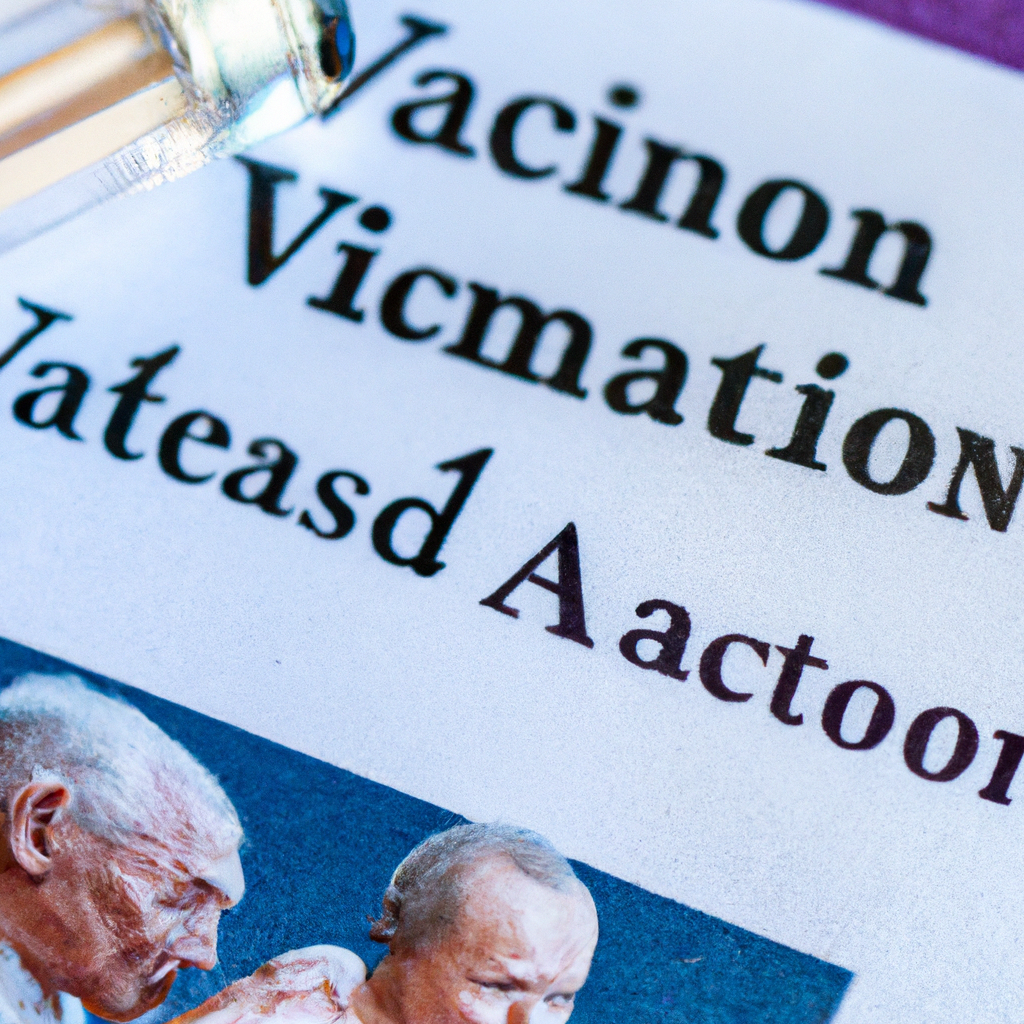As the years stack up, so does the risk for a variety of illnesses and infections that can take a toll on elderly adults. One of the best ways to protect ourselves, as well as those we love, is through immunization. This article will discuss the importance of immunization for our aging population, the benefits and risks associated with immunization, and how to navigate the vaccination process.
1. Vaccination: Strengthening Immunity with Age
As we age, our bodies become less able to fight off infections and illness. Our immune system – our body’s natural defence system – starts to weaken, reducing our ability to fight disease. Vaccines play an important role in helping ensure a strong immune system in the elderly.
- Builds immunity: Vaccines stimulate the body’s own immune system to produce antibodies in response to infection. This strengthens the body’s natural immunity to illnesses such as influenza, pneumococcal infection, and shingles.
- Low cost, effective prevention: Vaccines can be an economical form of disease prevention, especially among the elderly who are more prone to diseases. Vaccines prevent hospitalisation in most adults and reduce the severity of flu symptoms in elderly patients.
- Better health: Vaccines can help protect against infection and disease and have a positive effect on overall quality of life by helping the elderly remain healthy and active. Vaccinating against illnesses such as influenza can reduce the number of people in aged care facilities who become infected.
Vaccination is the most effective way to protect yourself and your loved ones from preventable diseases, and it is especially important for the elderly. Vaccines are safe, low-cost, and effective at protecting people from a variety of infectious diseases.
2. Vaccinations: Key to Protection for Elderly Patients
All too often, elderly patients neglect taking up vaccinations due to fear of side effects, or misconception that they are not necessary. In reality, however, vaccinations are key to the protection of elderly patients – and they are also the most promising step towards preventing serious health complications for this population.
Why Elderly Patients Need Vaccinations
Ageing can greatly alter the immune system, leading to a weaker response to infections and a decreased ability to fight off diseases. The following are some of the primary reasons why elderly patients should receive vaccinations:
- Reduce the odds of contracting common illnesses, including the flu
- Lower the risk of dangerous health complications from common illnesses
- Lessen the chances of other infections, such as pneumococcal disease
Moreover, recent research suggests vaccinations can even help to decrease the risk of certain types of cancer in older individuals.
Getting Vaccinated
When it comes to elderly patients, it is important for both the patient and their family members to stay knowledgeable and informed about the various vaccinations available. The doctor should provide clear details about which vaccinations are advised for the patient’s age, general health condition, and lifestyle. It is helpful to take notes, conduct additional research, and ask questions in order to create a comprehensive immunization plan.
3. Aging and Immunity: Reducing Risk with Vaccines
As we age, we become increasingly at risk of developing serious illnesses. Our immune system, while strong and adaptive, faces increasing challenges as we age which allow conditions such as coronary heart disease, diabetes, hypertension, and even cancer to manifest. The most effective way to reduce the risk of these life-threatening illnesses is through immunization.
Vaccines are vital for reducing the occurrence of debilitating and potentially fatal illnesses. They protect us against the most dangerous microorganisms, notably viruses such as influenza, pneumonia, and shingles. Furthermore, numerous studies have suggested that vaccinations can help lower the risk of cardiovascular diseases, as well as reduce mortality and morbidity of serious illnesses. And yet, it is estimated that one in four people who are eligible for immunizations do not receive any vaccinations.
It’s important to get the recommended vaccinations in order to help build your immunity and reduce the risk of serious illnesses. Here are some of the vaccinations adults should consider:
- Influenza – Recommended annually for everyone aged 6 months and older
- Tetanus-diphtheria-pertussis (Td/Tdap) – A booster dose should be taken every 10 years
- Measles-mumps-rubella (MMR) – A second dose should be taken if you have not had two before, or if you’re not sure.
- Pneumococcal (Pneumovax23 and PPSV23) – Recommended for everyone, once when aged 65+.
- Shingles (Zostavax) – For people aged 60 and over.
For people with weakened immune systems, additional vaccinations may be recommended. Speak with your healthcare professional to find out the best immunization for you.
4. Vaccination Strategies for the Elderly: A Proactive Approach
As the elderly are among the most likely to be severely impacted by the coronavirus, they must take extra precaution by ensuring their vaccination against the virus. It is essential that proactive strategies are employed to ensure elderly individuals are protected from potential exposure. Here are some recommendations for mitigating the risk of contraction and serious symptoms.
- Increase awareness of and access to vaccination clinics in elderly-focused communities.
- Optimize convenience by creating trust-based networks for transporting vaccinations into those communities or to the elderly individuals’ residences.
- Develop an outreach program to engage with rarely contenting populations, such as those who are homeless or part of minority groups.
Additionally, developing individual-level interventions such as a meal delivery service or online reminders for elderly people can also create a strong sense of collective awareness. Vaccination strategies for the elderly should strive to increase equitable access and focus on developing individual-level interventions that prioritize the elderly. Furthermore, public health professionals should continue to monitor the risk of COVID-19 to the elderly population and adjust strategies accordingly.
5. Effective Immunization for Seniors: Protecting Longevity and Quality of Life
As seniors age, immunizations become even more of a necessity for maintaining and protecting a healthy life. With the added benefit of extra disease resistance, immunizations help seniors protect longevity and live full, quality lives:
- Flu (Influenza) Vaccine: It is recommended that seniors receive the seasonal flu vaccine every year. It not only helps to reduce the rate of infection, but also a common incidence of serious, sometimes fatal, complications.
- Shingles Vaccine: Shingles, also known as herpes zoster, are caused by the same virus as chickenpox. The shingles vaccine is one of the most effective ways to help prevent the painful rash from forming in seniors.
- Tdap (Tetanus, Diphtheria, Pertussis) Vaccine: The pertussis vaccine helps protect against pertussis, whooping cough, an infection that can cause serious complications in seniors. It is recommended that seniors receive this vaccine every ten years.
- Cardiovascular Disease Vaccines: Vaccines that protect against diseases such as hepatitis B, pneumococcal pneumonia, and hepatitis A can help to protect against more serious cardiac and cardiopulmonary conditions.
- Pneumonia Vaccine: A pneumonia vaccine is recommended for seniors, especially those who are at higher risk of developing the infection. The vaccine helps to protect against both types of pneumonia.
Immunizations are a critical step in protecting the health of seniors and helping to support longer, healthier lives. Talking to a healthcare professional about which immunizations are necessary for your particular situation is the best way to make sure that you are fully protected.
By taking the necessary precautions, seniors can enjoy the benefits of a longer, more independent life. With immunization, seniors can enjoy the peace of mind and security that come with knowing that their health is actively protected.
The value of immunization for the elderly is invaluable. Vaccines provide the elderly with a simple and effective way to stay healthy and safe. Age should not be a barrier to getting vaccinated – immunity and longevity go hand in hand. By staying informed, staying safe, and staying vaccinated, elderly people can remain healthy and vital well into their twilight years.



